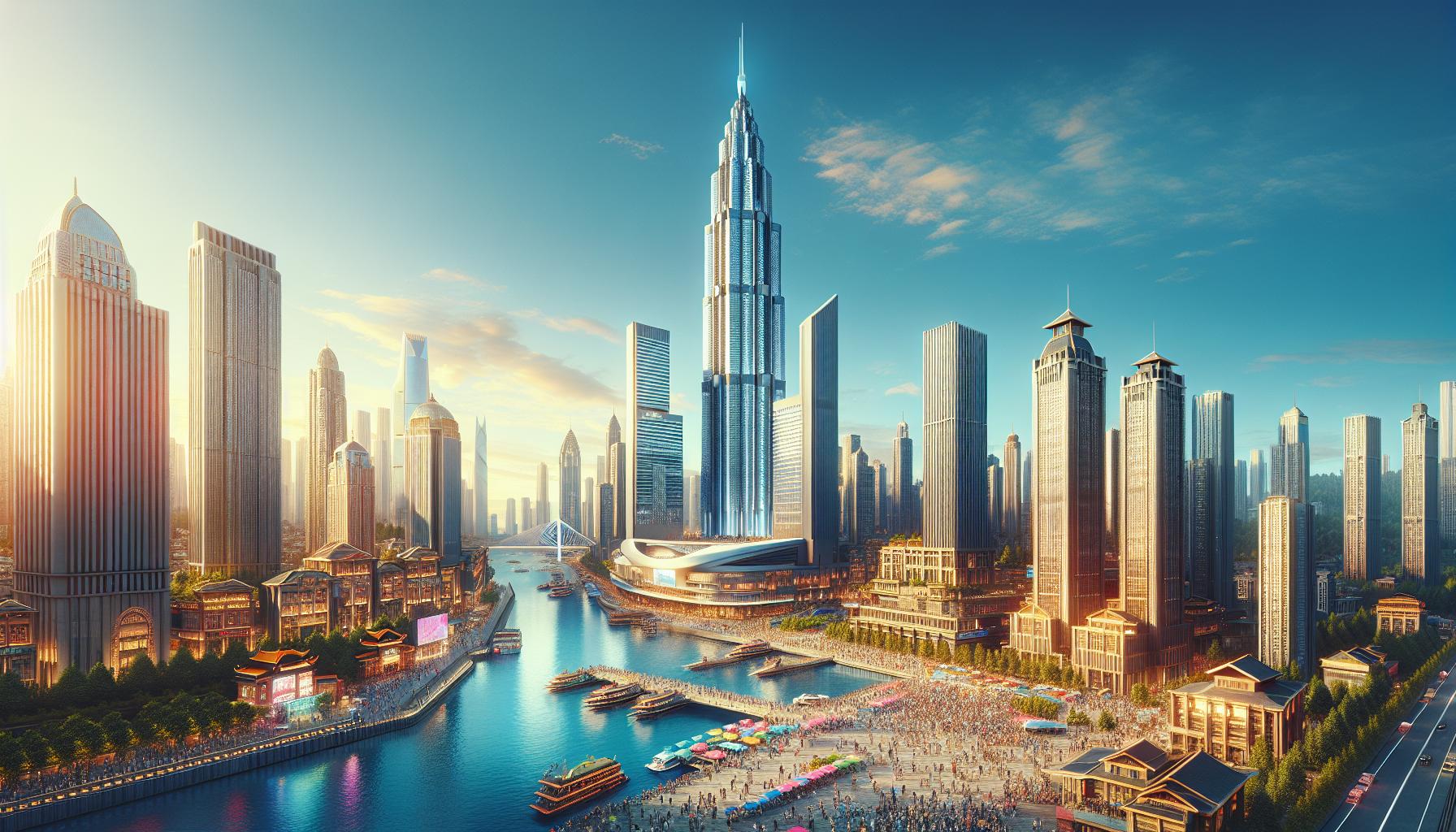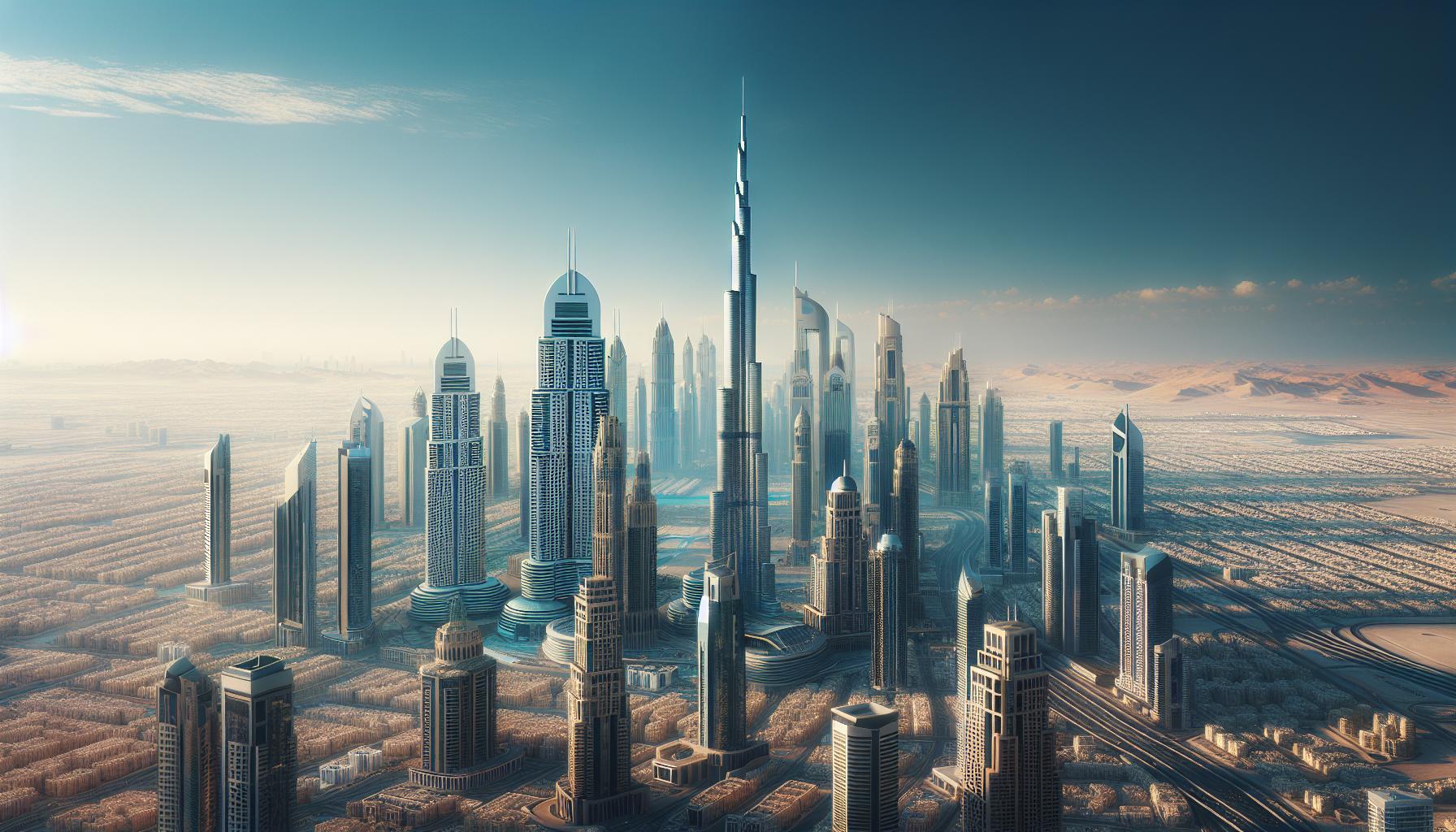
Dubai stands as a dazzling symbol of wealth and luxury in the heart of the Middle East. Its skyline, adorned with iconic skyscrapers and lavish resorts, draws millions of tourists and investors alike. But what fuels this opulence? The answer lies in a unique blend of strategic vision, natural resources, and innovative economic policies. From oil discoveries in the 20th century to a diversified economy today, Dubai has transformed itself into a global business hub. The emirate’s commitment to trade tourism and technology has attracted a myriad of international companies, creating a dynamic environment that fosters growth. As Dubai continues to evolve, understanding the factors behind its incredible wealth reveals valuable insights into the future of urban development and economic success.
How is Dubai So Wealthy
Dubai’s wealth stems from its strategic position, diverse economy, and robust infrastructure. It transformed from a modest trading port to a global financial center, effectively utilizing its geographical advantages.
- Natural Resources: Dubai possesses significant oil reserves, particularly in the 20th century, which provided initial financial stability. Oil revenues funded extensive development projects, laying the groundwork for future diversification.
- Economic Diversification: It successfully diversified its economy beyond oil. Key sectors include tourism, real estate, aviation, and finance. These sectors contribute to steady economic growth, reducing dependence on any single industry.
- Global Trade Hub: Dubai serves as a major global trade hub. Its location connects Europe, Asia, and Africa, facilitating international commerce. Jebel Ali Port, one of the largest in the world, enhances Dubai’s trade capabilities.
- Tourism and Hospitality: Tourism plays a crucial role in Dubai’s wealth. The city attracts millions of visitors annually with luxury hotels, shopping, and entertainment. Iconic landmarks like Burj Khalifa and Palm Jumeirah bolster its appeal.
- Investment in Infrastructure: Significant investments in infrastructure have spurred development. Projects like the Dubai Metro and extensive road networks enhance connectivity, supporting business operations and tourism.
- Business-friendly Policies: The government promotes a competitive business environment through initiatives and tax incentives. Free zones attract foreign investment, fostering innovation and entrepreneurship.
- Cultural Attractions: Dubai’s culture emphasizes luxury and modernity. Cultural events and festivals attract international attention, further enhancing its global status.
Each of these factors contributes collectively to Dubai’s remarkable wealth, ensuring its place as a leading global metropolis.
Historical Context
Dubai’s wealth derives from a transformation shaped by historical events and economic strategies. Key milestones include the discovery of oil and ongoing efforts for diversification.
Oil Discovery And Economic Boom
Oil was discovered in Dubai in 1966, marking a pivotal moment in its economic history. Initial discoveries led to substantial revenue generation, fundamentally shifting the economic landscape. The oil industry accounted for 90% of government revenue during the 1970s. This surge in income enabled significant investments in infrastructure, healthcare, and education, laying the groundwork for future growth. By leveraging oil revenues, Dubai developed vital projects, including modern roads, ports, and airports, which facilitated trade and tourism.
Diversification Efforts
Recognizing the volatility of oil markets, Dubai initiated diversification efforts in the late 20th century. The strategy included focusing on trade, tourism, real estate, and finance, reducing dependency on oil revenues. Initiatives such as the establishment of free zones attracted international businesses, fostering a favorable environment for foreign investments. Additionally, landmark projects like the Burj Khalifa and extensive tourism campaigns further solidified Dubai’s status as a global business hub. Today, non-oil sectors account for over 70% of the emirate’s GDP, showcasing the success of these efforts and ensuring economic resilience.
Key Factors Contributing To Wealth
Dubai’s wealth stems from various interconnected sectors fostering economic growth and attracting investments. The following key components highlight the drivers behind its prosperity.
Tourism Industry
The tourism industry plays a vital role in Dubai’s economy, generating substantial revenue and creating numerous jobs. In 2019, over 16 million tourists visited, drawn by attractions like the Burj Khalifa, Dubai Mall, and Palm Jumeirah. Luxury hotels and world-class shopping experiences cater to high-end travelers. Events such as the Dubai Shopping Festival and Global Village enhance the city’s appeal. The government actively promotes tourism through marketing campaigns and infrastructural development, ensuring continued growth.
Real Estate Development
Real estate development significantly contributes to Dubai’s financial landscape. The sector attracted $7.6 billion in foreign direct investment in 2021, a testament to its global allure. Iconic projects, including the Burj Khalifa and the Dubai Marina, showcase innovative architecture and luxurious living spaces. Comprehensive urban planning, including mixed-use developments, facilitates sustainable growth. Additionally, favorable regulations and ownership incentives attract global investors, further stimulating the market.
Financial Services Sector
The financial services sector positions Dubai as a leading international financial hub. The Dubai International Financial Centre (DIFC) houses over 2,400 companies, including major banks and investment firms. This sector contributed approximately 11% to Dubai’s GDP in 2020. The absence of income tax and a robust regulatory framework create an attractive business environment. Moreover, advanced fintech innovations enhance the sector’s capabilities, making it an appealing destination for both local and international investors.
Government Initiatives
Government initiatives play a crucial role in cultivating Dubai’s wealth. Strategic economic policies and substantial infrastructure investments significantly contribute to the emirate’s growth and global prominence.
Economic Policies
Economic policies in Dubai focus on diversification and sustainability. The government promotes free trade zones, encouraging foreign businesses to invest and operate without taxes or restrictions. For instance, Dubai Multi Commodities Centre (DMCC) serves as a hub for global trade with over 18,000 registered companies. Additionally, initiatives like the Economic Substance Regulations and the Dubai 2040 Urban Master Plan aim to create a more resilient and competitive economy. These policies ensure that non-oil sectors continuously attract investment, resulting in reduced dependency on oil revenues.
Infrastructure Investments
Infrastructure investments represent a cornerstone of Dubai’s growth strategy. The government has allocated billions for developing world-class facilities, such as the Dubai International Airport, which ranks among the busiest airports globally. Furthermore, ongoing projects like the Expo 2020 site highlight the commitment to urban development and tourism enhancement. The network of roads, public transportation, and smart city initiatives supports business operations and improves residents’ quality of life. Through significant infrastructure investment, Dubai maintains its status as an attractive destination for tourists and investors alike.
Global Trade Hub
Dubai serves as a vital global trade hub, leveraging its strategic location and innovative economic policies to facilitate international commerce and attract investment.
Strategic Location
Dubai’s strategic location at the crossroads of Europe, Asia, and Africa enhances its role as a global trade center. The emirate sits within an eight-hour flight of two-thirds of the world’s population, allowing unparalleled access to key markets. Jebel Ali Port, the largest man-made harbor, serves as a critical logistics center for businesses, handling over 20 million containers annually. Moreover, Dubai International Airport ranked among the busiest airports globally, accommodating over 86 million passengers in 2019. This extensive connectivity fosters trade relationships, making Dubai an ideal choice for multinational companies.
Free Trade Zones
Dubai’s free trade zones play a crucial role in attracting foreign investment. These zones offer tax exemptions, 100% foreign ownership, and simplified business regulations. More than 30 free zones exist, including the Dubai Multi Commodities Centre (DMCC), housing over 18,000 registered companies and facilitating $48 billion in trade. The Dubai Airport Freezone and Dubai Silicon Oasis further cater to aviation and technology industries, respectively. These zones stimulate economic growth by encouraging innovation and entrepreneurship, reinforcing Dubai’s status as a prominent trade hub. Dubai’s wealth is a remarkable blend of strategic vision and innovative policies.
The emirate’s transformation from an oil-dependent economy to a diversified global hub showcases its resilience and adaptability. With a focus on trade tourism and technology Dubai has successfully reduced its reliance on oil while fostering a vibrant economy. The government’s commitment to infrastructure development and a competitive business environment continues to attract foreign investment. As Dubai evolves it remains a symbol of luxury and opportunity drawing millions of visitors and investors alike. This dynamic city is poised for ongoing growth ensuring its wealth will endure in the years to come.
















